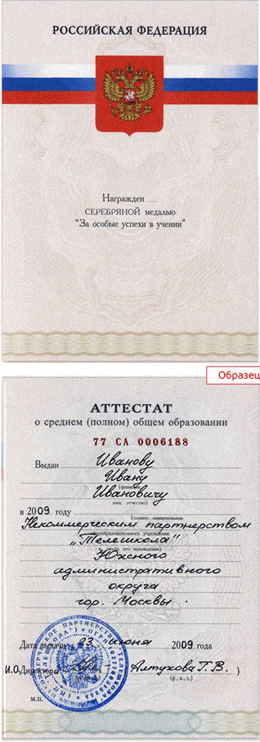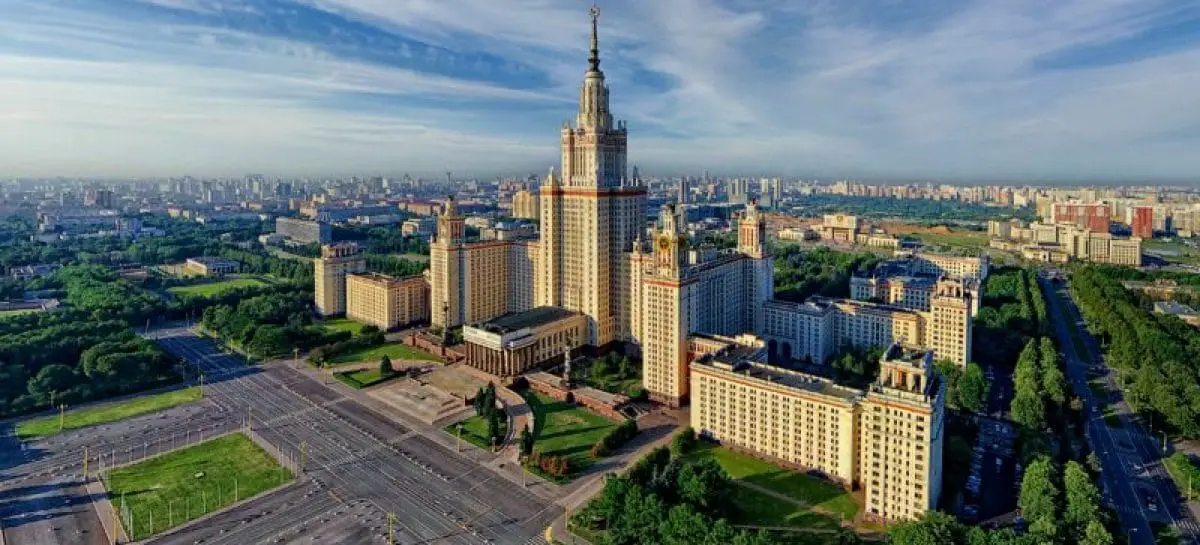Eksternat (rus: Экстернат) is a form of distance learning in the public education system of many post-Soviet countries. It allows students to study at their own pace and to pursue other interests while in secondary school. Olga Dmitraschenko, for instance, opted into the system in order to graduate a year early and pursue an internship with SRAS to gain work experience before even heading to college. She wrote much of the text that follows as part of a series of free Russian lessons sponsored by SRAS called Olga’s Blog, which documented – in simplified, modern Russian – her experience finishing high school and starting college in Moscow in 2006. The text, links, and format of this resource were last updated in 2023.
Briefly about Eksternat
Eksternat is a Russian educational concept that refers to a system of distance learning that enables students to study and take exams outside of traditional classroom settings. Students can learn at their own pace and thus finish their education earlier if desired. In the eksternat system, students are not required to attend regular classes, but rather can study on their own with the help of textbooks, instructional materials, and online resources.
The eksternat system is primarily used for secondary education, although it is also available for some higher education programs as well. Students who choose to study through the eksternat system are required to pass exams at the end of each academic year or semester to demonstrate their knowledge and progress. These exams are usually held at designated testing centers, and may be proctored to ensure academic integrity.
The eksternat system was first established in the Soviet Union in the 1950s, and has been retained by many post-Soviet countries, including Russia, Belarus, Ukraine, and Kazakhstan. The system is popular among students who have difficulty attending regular classes due to work or family obligations, as well as those who prefer to study independently.
While the eksternat system offers flexibility and convenience, it also requires a high level of self-discipline and motivation on the part of the student. Success in the eksternat system requires a strong commitment to learning and a willingness to take responsibility for one’s own education.
Eksternat: Simplified Russian Text from Olga’s Blog
This is lesson 1 of Olga’s Blog, a series of intermediate Russian lessons.
Note that:
- All of the bold words and phrases have annotation below.
- Red words and phrases indicate the subject of this blog entry’s grammar lesson.
- *Asterisks indicate slang.
Дорогие друзья!

Меня зовут Ольга, мне шестнадцать лет, в этом году я закончила экстернат и поступила в университет. Экстернатная форма обучения отличается от обычной школы, поэтому, думаю, вам будет интересно узнать об этом подробней.
Экстернат – это образовательная программа на платной основе, позволяющая школьнику пройти курс обучения за короткий срок и освободить время для подготовки к поступлению в университет. Экстернаты бывают разные. Но чаще всего экстернат – это полностью домашнее обучение, в школу ученик приходит только чтобы получить консультацию и сдать экзамен. Но мой экстерн немного отличался от обычного. Там были занятия как в обычной школе. Окончив девятый класс в гимназии №55 (номер пятьдесят пять), я перешла в экстернат при 148 школе (сто сорок восьмой школе). И с этого момента все стало по-другому. Я должна была пройти десятый и одиннадцатый класс за один год.
Это казалось невозможным, но в экстернате все было так разумно спланировано, что все получалось легко и быстро. В нашем классе было восемнадцать человек. В школу мы ходили три раза в неделю и занимались по шесть уроков. Это намного меньше обычного. Ведь в обычной школе ребята учатся шесть дней в неделю по восемь уроков, устают, и конечно им не хватает времени ни на общение с друзьями, ни на дополнительные занятия и репетиторов. У меня хватало времени на все – и на экстернат, и на подготовительные курсы в МГУ, которые я посещала тоже три раза в неделю, и на друзей. Предметы у нас были те же самые, что и в обычной школе. Просто занятия строились так, что материал давался только основной, и то сжато, и быстро. Каждые два дня мы проходили новую тему, поэтому приходилось много заниматься самостоятельно – дома, а именно – поиск информации в Интернете, посещение библиотек.
Это развило во мне большую ответственность. Я стала серьезнее относится к учебе. Ведь если не поймешь предыдущую тему, не поймешь и следующую. Но, несмотря на все сложности, учиться в экстернате намного приятнее, чем в школе. Преподы* относятся к ученикам добрее. Сами ребята настроены на учебу – они уже знают, куда будут поступать, занимаются на подготовительных курсах и не забивают уроки.*
Это все на сегодня. Отрываюсь* в последние дни каникул перед университетом. Надеюсь, мы встретимся еще в этом месяце, чтобы поболтать еще о России! Пока!
Vocabulary and Cultural Annotations
Экстернат: Roughly equivalent to “Home School,” but really has no direct translation. In this particular case, the English term “Accelerated High School Program” could be used more effectively. (Экстернатная форма обучения = “External form of education.”)
Платной основе: paid basis. Public schools in Russia are free (like in America) but certain programs such as экстернат require additional fees.
Ученик: pupil; student
Девятый класс: ninth grade (Russian education has only eleven grades, there is no twelfth grade)
Гимназия: high school (from the Latin “gymnasia“) – In Russian the numbers for schools are almost always written as numerals. We have provided the written form as well in parenthesis.
Ведь: literally “you know,” but quite hard to translate, as it used much more flexibly, where an English speaker might say “obviously,” “you see,” or even “because.”
Дополнительные занятия и репетиторов: additional (extra-curricular) courses and training. Can include courses in various subjects from biology to German, and from art and physical education. (e.g. Предполагаю, что поступлю, так как хожу на дополнительные занятия к репетиторам по биологии и литературе.)
МГУ: Moscow State University – Russia’s most respected and widely known university (Московский государственный университет им. М.В. Ломоносова).
Сжато: brief
Препод:* slang term for teacher (short for преподаватель). Roughly equivalent to the English slang “teach” as in “Yo, teach, waz da ansa ta numba five?!” Standard words to use include: учитель, преподаватель.
Настроены: well-disposed to (inclined to enjoy and take seriously)
Куда будут поступать: where they will enter (university, college)
Забить урок:* slang term for purposefully being absent from school. Roughly equivalent to the English “skipping school” or “playing hooky.” The standard phrase to use is “пропустить урок.”
Отрываюсь:* Slang term meaning to “to have fun” (literally: to tear or come off). The standard word to use is “развлекаться.”
Grammar Focus: Present Active Participles in Russian
Verbs in Russian, like those in English, have forms that may be used as adjectives. These forms, known as participles, are often used as a simple way to provide variety and flexibility to sentence structures.
In English, present participles are most often formed by adding –ing to the end of the verb. For example, in the sentence “the boy walking the dog is my friend,” “walking” is actually used as an adjective (adjectival participle) to describe the boy. It is not a verb in this case. In the “Olga’s Blog” example, “Экстернат – это образовательная программа на платной основе, позволяющая школьнику пройти курс обучения за короткий срок,” “позволяющая” is also used as an adjective – to describe “программа.” We can translate this phrase as “Экстернат is an educational program on a paid basis allowing students to finish their education in a short time period.”
An important difference to note is that in English, all present participles are formed with –ing, but in Russian, active verbs form their participles differently from intransitive (passive) verbs.
For now, we shall only consider the present active participles.*
Present active participles can be formed only from imperfective verbs (since perfective verbs don’t have a present tense), but can be made from transitive or intransitive verbs.
Present active participles are formed in Russian from the “they” form of the present tense of the verb. For example:
Читать (to read) – читают (they read) – читающий (reading)
Писать (to write) – пишут (they write) – пишущий (writing)
Говорить (to speak) – говорят (they speak) – говорящий (speaking)
Позволять (to allow) – позволят (they allow) – позволяющий (allowing)
Ходить (to go) – ходят (they go) – ходящий (going)
Important! Participles must be declined as adjectives for gender, number, and case! Simply change the –ий ending to suit. For example:
Nominative Case: читающий (m.); читающая (f.); читающее (n.); читающие (p.)
Genitive Case: читающего (m.); читающей (f.); читающего (n.); читающих (p.)
Catch part 2 of this lesson on participles in lesson 2 of Olga’s Blog!
Examples from Literature and the Press
Иван Николаевич Попов, известный поэт, пишущий под псевдонимом Бездомный.
М. Булгаков
Говорящий таракан по-прежнему пугал ее. А. Житинский
Процессия останавливается, солдаты окружают эшафот кольцом, и на него входит чиновник, читающий приговор. А. Ф. Кони
Люблю вас, читающих эти строки. М. Беленький
Для некоторых это оказалось единственным путем, позволяющим выбраться из нищеты. П. Корнилаев
Но в конце концов не всякому доставит удовольствие общение с говорящей лягушкой, будь она хоть гением. А. Горцев
По словам министра образования Владимира Филиппова, Россия входит в 9% стран, так и не принявших систему 12-летнего образования. А. Хрусталева
More Free Russian Lessons From Olga’s Blog

The Language and History of Caviar: Olga’s Blog
Olga below describes the place of caviar in Russian food culture. In simplified Russian, she describes where the delicacy is harvested from, the major types of caviar, and how the types differ in cost and quality. We also provide an English primer below discussing more of the history of caviar, how it is eaten and […]

Mushrooms in Cultures and Cuisines: Olga’s Blog
Olga below continues her discussion of the deeply held place that mushrooms have in Russian culture. In part one of this discussion, she focused on how and where and find the mushrooms. In part two, below, she discusses how the mushrooms are preserved, prepared, and consumed. A staple of the regional diet for centuries, mushrooms […]

Mushroom Season Has Begun! Olga’s Blog
Olga below discusses the deeply held national tradition of mushroom gathering. An important part of Russian food tradition for many centuries, Russian children are taught in school from an early age to tell the difference between various types of native mushrooms. Many, like Olga, will go with relatives and friends to the woods to put […]

Study Abroad in America for Russians: Olga’s Blog
As part of her major program in international relations at Moscow State University, Olga applied to study abroad in the United States in 2007. As was not uncommon for students applying for study abroad in either direction, Olga hit several bureaucratic snags. What is perhaps most remarkable about the below text, however, is the description […]

What is the First Day of University Like in Russia? Olga’s Blog
Below, Olga discusses what a first year freshman experiences on day one of their college education. The day offers no classes. It is instead filled with speeches, handshakes, and status symbols. All of this is highly indicative of the role of formality and ceremony in Russian education and Russian society. This resource is part of […]





